PLEASE NOTE: Our website and products are undergoing major renovations. We apologize for the inconvenience, but we believe you will like the changes being made to offer you an even better drink alternative. Enjoy life!
Hopwater® is the mood motivating water enhancer that is alcohol-free, calorie-free, fat-free, gluten-free, sugar-free (no glycemic impact), and allows you the freedom to enjoy water with benefits!
How Can Hops Improve Your Health and Wellbeing?
The first association that most people have when they hear the word ‘hops’ is beer. Indeed, hops (humulus lupulus) are most famous for being one of the ingredients of beer. To be more precise, the bitter taste in beer comes from this plant.
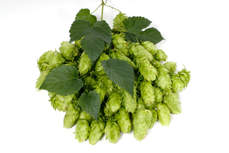 Nevertheless, Hopwater can have a beneficial effect on our health and general wellbeing as a water enhancer. In this article, you’ll find out more about seven different ways that Hopwater can add to your health. However, since every person reacts differently to herbal remedies, don’t take any of these without a prior consultation with your doctor.
Nevertheless, Hopwater can have a beneficial effect on our health and general wellbeing as a water enhancer. In this article, you’ll find out more about seven different ways that Hopwater can add to your health. However, since every person reacts differently to herbal remedies, don’t take any of these without a prior consultation with your doctor.
1) Treating ulcers
One of the most uncomfortable issues of the digestive tract, ulcers can cause a lot of pain and stress. They’re both painful and unpleasant. While there are convenient ways to treat them, some people try alternative methods to heal their ulcers.
In line with that, Czech scientists have found that hops have a soothing effect on ulcers. Apparently, the hops in Hopwater contain a certain chemical combination that successfully combats the bacteria that contribute to the development of ulcers.
2) Soothing skin inflammation
Skin can become inflamed in many different ways, especially in summer. From allergy to the sun to various food allergies manifested on the skin, there’s a large number of potential issues with the largest organ on our body.
This is where Hopwaters come on stage. Since it contains a fair amount of antioxidants, it can help you alleviate the effects of inflamed skin. Therefore, you can consume Hopwater or use products for skin care with hops.
You can feel another beneficial effect of hops on your skin if you use Hopwater to wash your hair. The hops in the Hopwater will soothe both your scalp and your follicles to improve the general condition of your hair.
3) Maintaining oral hygiene
As we’re growing older, the number of oral infections we’re prone to is increasing. As a result, we end up visiting our dentist more frequently than we’d like to.
Due to the aforementioned antioxidants contained in hops, it’s beneficial to develop the routine of drinking Hopwater daily. It will keep your oral hygiene at a high level and nip some infections in the bud.
For many people, immunodeficiency results in small but painful mouth ulcers (aphthae). So, when you realize that you’re working a lot or you have too many obligations, herbal tea with hops can make the aphthae go away and even stop their growth in the first place.
4) Alleviating breathing problems
In some periods of the year, a large part of the population has some sort of breathing problems. Coughing, difficult breathing, and a runny nose are only some of the issues we’re facing in those periods.
Hopwater can alleviate these respiratory issues and increase your quality of life in such situations.
So, one cup of tea with hops flowers per day can contribute to your wellbeing. Still, it’s not a magic potion and you should never ditch your regular medicines on account of hops tea.
5) Protecting mental health
Many old couples live alone, which is why they need all sorts of couples care and support. Since both their physical and mental health is in danger, it’s important to pay special attention to both these aspects of their wellbeing.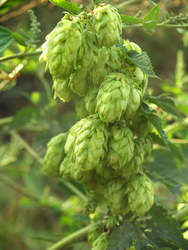
Thanks to the chemical substance called xanthohumol, which can enhance the brain protection from different oxidants and their effects. If you take the prescribed amount of Hopwater daily – it’s usually 3 dropperfuls/water up to three times a day –it can contribute to better vital condition of your brain and reduce the risk of dementia.
6) Healing headaches
Although beer lovers might object, Hopwater can actually heal headaches. We’ve already pointed out that hops can have a soothing effect on our body. When it comes to headaches, hops simply relax your nerves: It doesn’t only ease the tension in your nervous system, but it also relieves the stress accumulated in your back muscles and your shoulders.
Even if you don’t feel a headache,use Hopwater after a strenuous day at work and use its soothing effects. It will help you sleep better too.
7) Relieving the digestive issues
Modern people suffer from various digestive issues, from constipation and candida to different bacteria. Hopwater can help you relieve the digestive issues and reduce the amount of stress you feel in that area. Again, it’s the soothing effect of hops that will relax your stomach and your intestines. A glass of Hopwater can help you remove the tension from your stomach.
Also, you can use skin cream with hops to massage your stomach. It will both calm the stomach and nourish your skin.
Conclusion
We’ve provided some alternative uses of hops that will help you maintain your wellbeing. It comes in many different varieties of Hopwater so choose the one you feel would taste most pleasing to you. Still, bear in mind that in case of more serious health problems, Hopwater can be used only as an addition to the therapy given to you by medical professionals.
AuthorBio: Anne Harris is an HR specialist working for londonlive-incare.com. She eagerly shares her knowledge with her audience on various blogs. When she isn’t writing or attending wellness conferences, she likes to pack her rucksack and ride her day away on her bike or spend time with her friends.
CVS Pharmacy Report on Hops
|
|
|
What You Need to Know
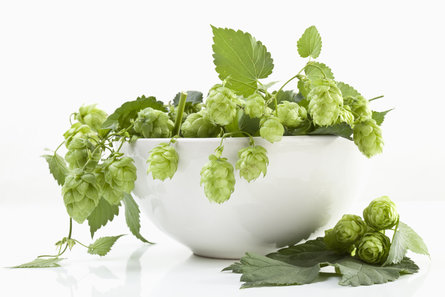
In herbal medicine, hops are said to offer a number of health benefits. The female flowers of the Humulus lupulus L. plant, hops are often used to treat arthritis , fibromyalgia , insomnia , diabetes , and menopausal symptoms . Although findings from lab experiments and animal research indicate that hops may possess certain health-enhancing properties, few studies to date have tested hops' potential benefits for human health.
The Science Behind Hops' Health Benefits
Here's a look at some findings from the available research on hops' health benefits:
1) Menopause
Test-tube research shows that 8-prenylnaringenin (a substance found in hops) may act as a phytoestrogen (a natural chemical known to mimic the action of estrogen). Since levels of estrogen are known to decline during menopause, some women take hops in order to soothe menopausal symptoms. Indeed, a 2006 study from the journal Maturitas found that daily intake of hops helped relieve menopausal symptoms (such as hot flashes). The study involved 67 menopausal women; treatment lasted 12 weeks.
2) Insomnia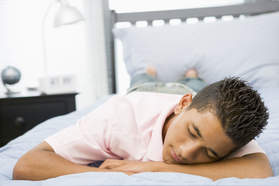
Pairing hops with valerian may help treat insomnia, according to a 2010 research review published in Australian Family Physician. The review included 16 previously published studies, 12 of which found that the use of valerian on its own or in combination with hops helped improve sleep quality and lessened the amount of time it takes to fall asleep. Used as a bittering agent in beer, hops are thought to deliver sedative effects.
More Research on the Health Benefits of Hops
According to findings from tests on animals and on cells in culture, hops show promise as a natural means of preventing cancer, treating diabetes, and reducing obesity risk . However, these findings have yet to be explored in clinical trials.
Should You Use Hops for Health Purposes?
Little is known about the safety of long-term use of hops. However, people with hormone-sensitive conditions (such as certain forms of breast cancer ) may need to avoid hops-containing supplements (due to hops' estrogen-like activity). If you're considering the use of hops in treatment or prevention of any condition, talk to your doctor to weigh the potential risks and benefits.
Sources:
Heyerick A, Vervarcke S, Depypere H, Bracke M, De Keukeleire D. "A first prospective, randomized, double-blind, placebo-controlled study on the use of a standardized hop extract to alleviate menopausal discomforts." Maturitas. 2006 May 20;54(2):164-75.
Ho YC, Liu CH, Chen CN, Duan KJ, Lin MT. "Inhibitory effects of xanthohumol from hops (Humulus lupulus L.) on human hepatocellular carcinoma cell lines." Phytother Res. 2008 Nov;22(11):1465-8.
Milligan SR, Kalita JC, Pocock V, Van De Kauter V, Stevens JF, Deinzer ML, Rong H, De Keukeleire D. "The endocrine activities of 8-prenylnaringenin and related hop (Humulus lupulus L.) flavonoids." J Clin Endocrinol Metab. 2000 Dec;85(12):4912-5.
Salter S, Brownie S. "Treating primary insomnia - the efficacy of valerian and hops." Aust Fam Physician. 2010 Jun;39(6):433-7.
Yajima H, Ikeshima E, Shiraki M, Kanaya T, Fujiwara D, Odai H, Tsuboyama-Kasaoka N, Ezaki O, Oikawa S, Kondo K. "Isohumulones, bitter acids derived from hops, activate both peroxisome proliferator-activated receptor alpha and gamma and reduce insulin resistance." J Biol Chem. 2004 Aug 6;279(32):33456-62.
Yajima H, Noguchi T, Ikeshima E, Shiraki M, Kanaya T, Tsuboyama-Kasaoka N, Ezaki O, Oikawa S, Kondo K. "Prevention of diet-induced obesity by dietary isomerized hop extract containing isohumulones, in rodents." Int J Obes (Lond). 2005 Aug;29(8):991-7.
The following information is taken from herbs2000.com :
Hops
Humulus lupulus

- Common Hop
- English Hop
- European Hop
- Hops Vine
- Lai-ei-ts'ao
- Le-ts'ao
The hops or the hop plant bears the name Humulus lupulus L. in botanical circles. This perennial plant belongs
to the plant family Cannabidaceae. The plant is a climbing vine, which gives out scaly and cone shaped fruits called
hops from which the name for the whole plant is drawn. The hops or the fruit of the plant is botanically termed a
strobile, the fruit bears numerous glandular hairs on the surface, these hairs possess a resinous bitter principle, the
reason for the extensive utilization of the hops in processes such as brewing and in herbal medicine. Primarily a
temperate European plant, extensive and large scale cultivation of the hops takes place in places like the Czech
Republic, Poland, England and Germany in Europe, as well as in the United States and South America, and in
places such as Australia. Harvesting and collection of the hops is normally carried out during the month of 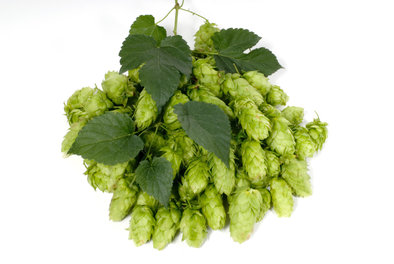
September when the fruits ripen and following
a drying process, these are marketed and used mainly in the
brewing industry. The medicinal and tonic properties of the
hops was also apparently known to traditional herbalist
even if the primary use of the hops has been in the
manufacture of beer, with which it has been associated for
close to a 1,000 years now - the hops has been valued for
its bitter taste and preservative action. Early on in Europe,
tradition holds that people who plucked the hops fruit
seemed to tireout easily, this was probably due to the accidental transfer of some of the hop resin in the hands to the
mouths of the workers - this sedative action of the herb was the reason for its use in herbal medication, and a
sedative action has traditionally been associated with the hops. Traditionally, herbalist treated sleeplessness and
other nervous conditions in patients by making them use pillows stuffed with the dried hops. The hops was also
associated with an ability to reduce inflammation in the body, thus a small bag of hops soaked in alcohol and placed
after heating on an afflicted area, is said to lead to a reduction in the localized inflammation affecting the area. At the
same time, herbal tonics made from the aqueous extracts of hops using boiling water have also been traditionally
used in Europe.
The resin in the hops has been found to contain chemically unstable polyphenolic principles, particularly the
compounds known as humulone and lupulone. The presence of these compounds or the presence of their closely
related chemical conversion products in the hops is the reason for the plant's bitter and bacteriostatic properties -
these agents are also responsible for the distinct flavor and aroma of the hops. Different types and varieties of the
hops plant tend to differ in the content of these chemical compounds, at the same time, these chemical compounds
are not stable in the presence of air and light and are thus difficult to extract. This can be seen in real time, as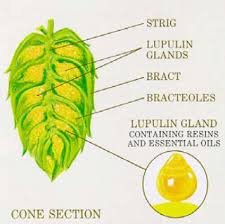
demonstrated during a study only about 15 percent of the original chemical activity
in the hops was seen in a batch of hops following nine months of storage. The so
called sedative action of hops seem to be merely imaginative and superstitious as
the earlier studies on the hops specific to this property failed to identify any
particular sedative principles in the plant - thus the use of the hops in the form of a
pillow seemed to be mere superstition held during medieval times. The presence of
a volatile alcoholic compound, known as 2-methyl-3-butene-2-ol (dimethylvinyl
carbinol), has recently been isolated from the hops - this compound is believed to form some part of the plant's
sedative properties - though requiring further studies. Fresh hops has very little of the alcohol and only small
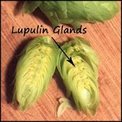 amounts can be detected in any single fruit, however the concentration of this
amounts can be detected in any single fruit, however the concentration of this
alcohol seems to increase when the hops is subjected to drying and this volume
reaches a maximum value within a two-year period at about 0.15 percent of the
total volume - thus the sedative action of the hops may not be superstition at all.
Parts used
Strobiles.
In the earliest herbal medical system, the hops was only an occasional ingredient,
and all the health benefits traditionally alluded to the plant is very similar to how we understand and use them at
this present time.
Remedies made from the hops plant is very effective in the treatment of tension especially when it is blended with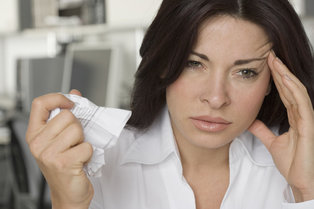
other healing herbs, such blends are also used for treating headaches.
Such herbal blends containing hops must not be used if depression is a
symptom. The treatment of certain types of asthma conditions and
even painful menstrual symptoms can be carried out using hops as its
anti-spasmodic action is very effective in such cases.
Clinical use of the alcoholic hop extracts in different dosage forms has
also been used by doctors in the People's Republic of China, in treating different forms ofdiseases such as leprosy,
problems like pulmonary tuberculosis as well as acute bacterial dysentery with varying results. The presence of a
couple of antibioticbitter acids, called lupulon and humulon in the herb may be the reason for the partial
effectiveness of such treatments. These two compounds are known to kill certain strains of Gram positive and acid-
fast bacteria, example, the staphylococcus strain. The infections from staphylococcus is evident in cases of
suppurating wounds, in cases of runny sores, and all manners of abscesses, some types of boils as well as
osteomyelitis - which is the presence of inflammation in the bone marrow of people.
For treatment of problems with dandruff, the remedy can be rubbed into the scalp after scrubbing the hair with a
strong detergent following a thorough rinsing of the hair using plain water - this treatment will aid in the prevention
and control of dandruff and flaky skin in the scalp. The best preventive
measure against dandruff and the quickest and easiest way is to rinse the
hair well each day using a can of beer per wash. This is a very good
remedy, and all brands of beer can be used for the purpose.
In experiments with nervous patients, the hops has been clinically seen to induce a very
strong sedative action over the person, in this role insomniacs on hops extracts were also able to get a good night's
sleep during tests. To make this sedative extract of the hops, boil two pints of water as an initial step. To the boiling
water, can be added a heaping tbsp. of hops and the same amount of chopped valerian root, the boiling pot must
then be covered and the heat on the stove reduced. The herbal mixture must be simmered in the water for five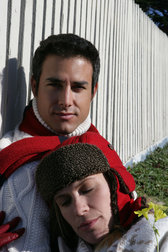
minutes and then removed from the flame, after which the herbs must be allowed to steep
for an additional forty five minutes in the water. To help bring relaxation to the body, use
the infusion sweetened using a little bit of pure maple syrup, doses of one and a half cups
of the infusion can be taken by patients at a time. Hops tends to lose its sedative properties
relatively quickly especially when it is stored, for this reason, the herb must be used
immediately after it is freshly plucked or as soon as possible and immediately after having
been dried or cut up - this applies only when the sedative action is needed.
Traditionally, hop filled pillows were used for inducing sleep; this indicates an old knowledge of the supposed
sedative action of hops in the herbal lore. In traditional herbal practice, the hops was believed to be helpful in
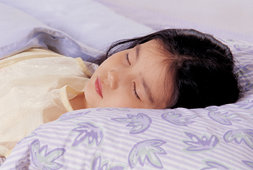 relieving muscle tension as well as anxiety, it was believed to be helpful in
relieving muscle tension as well as anxiety, it was believed to be helpful in
soothing pain, and in quieting restlessness as well as mental agitation of
patients. Hops also aids in reducing tension along affected muscles in the body
due to its strong anti-spasmodic actions, this effectively relieves muscular
spasms and cases ofcolic in the gut. This action also ensures hops is an
excellent remedy for cases of conditions such as irritable bowel syndrome,
problems like diverticulitis, problems like nervous indigestion, along with problems such as peptic ulcers,
problems like Crohn's disease, ulcerative colitis and other kinds of stress related digestive problems affecting
patients. In addition, digestive action in the body is aided by the bitter principles present in the hops, these enhance
the action of the liver and aid in the secretion of bile as well as other digestive juices in the body of the patient. Hops
based compounds called tannins also aid in the quick healing of irritated inflammatory conditions of many types and
can treatdiarrhea. The strong antiseptic action of the hops also relieves infections in the body. Hops also possess
very strong estrogenic action, which makes it an excellent remedy for all sorts of problems in the body connected
with menopause in women. Painful and suppressed menstrual periods can also be treated using the hops based
medications. The elimination of toxins from the system is effected by the asparagin content in hops and this
compound is a soothing diuretic, aiding in the reduction of fluid retention. The combination of this property of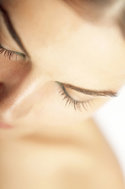
affecting the liver and its ability to cleanse toxins has ensured hops have a reputation as a
cleanser of skin problems of all kinds. The anti-histamine action and relaxant functions of
the hops is also very useful in cases of skin problems. Creams containing the hops are used to
keep the skin soft and supple and are used in the role of wrinkle delaying lotions. Hops also
have a strong antiseptic action and this is effective in treating cuts, all sorts of skin wounds
and ulcers on the body.
Culinary uses
Hops can be used in the same way as asparagus - the young shoots can be served and prepared for different types
of meals. Hops shoots must be prepared by boiling for two to three minutes in some water; ideal length of shoots 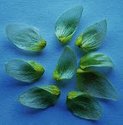
for the table is five to ten cm long - two to four inches in length. After boiling for two to three
minutes, the water is normally changed and the spears are then steamed till they become tender.
These cooked hops shoots can be served with some melted butter or a cheese sauce as dinner or
lunch. The blanched hop spears (young shoots) are served as a delicacy in many of the hop
growing European countries.
Beer is seasoned with hops and the plant is an essential ingredient in the brewing of beer. Hops are always added to
beer, regardless of it being brewed at home or in any commercial breweries. The bitterness in beer is in fact, the
resin in the hops cone's lupulin glands.
Oil and other organic compounds extracted from the hops are used in many commercial products, it is used to flavor
yeast, to flavor candy, to spice up ice creams and puddings, as well as to flavor gelatins, baked goods, different
types of chewing gums, different kinds of confectionery items as well as condiments of all kinds.
Craft uses
Wreaths and garlands in Europe often include the dried cones in the decorative motif.
Habitat and cultivation
The hops plant is native to Europe and is also found indigenously in some parts of western Asia. In places where it
grows in the wild, the hops tend to flourish along waste dumps and on the roadside wastelands. The hops are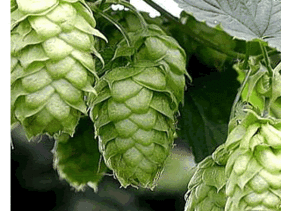
cultivated along much of northern Europe on a large commercial basis
for use in the brewing industry. The main product are the flowers
from the female plant, called strobiles, which are harvested in the
early autumn and then subjected to drying at a low temperature for
later use in the brewing industry.
Deep, humus rich and well drained soils or very deep and sandy or
gravelly loam soils are ideal for the growth and cultivation of hops.
The pH range from 6.5 to 7.0 is recommended for ideal growth of the hops. Hops plants tend to grow well and
prefer well light places with abundant sunlight, though the hops can tolerate light shade. The growth of the hops
vines grow ensures that the leaves of the plant receive as much light as possible for optimum growth and maturity.
The plants must be well watered during the entire length of the growing season for maximum growth. In the
cultivation of the hop, plants are generally propagated using the root cuttings which produces female flowers - even
though it is also possible to use seeds for cultivation of the plant. A sturdy wooden trellis needs to be provided to the
growing plants for the vines to climb and grow. During the early summer, the twining stems may need to be trained
by hand to establish the direction of growth.
The hops are very vulnerable to many destructive plant viruses as well as several fungal plant diseases. The downy
mildew in particular. Hops is also susceptible to attacks from plant eating spider mites and other insects like the flea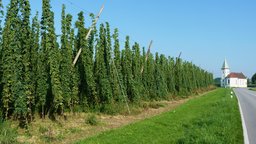
beetles, the vine borers, and plant juice sucking aphid species. Insecticides
and pesticides may need to be sprayed to control the disease and insects
whenever necessary. If the infection from some types of fungus and viruses is
too severe, the entire batch of plants may need to be destroyed and it may be
necessary to start all over again in another location with different batch of
plants.
The hop plants are resistant to cold temperatures and plants can survive through cold weather, a dormant period
initiated by frost may be needed by some plants in order for them to resume full growth during the winter season.
Winterkill is avoided in the very cold regions of northern Europe by a good snow cover on the plants.
Research
The digestive system is strongly and effectively stimulated by the bitter principles present in the hops, these bitters
tend to increase the gastric and other secretions in the stomach of a person. While there is no full knowledge of
how 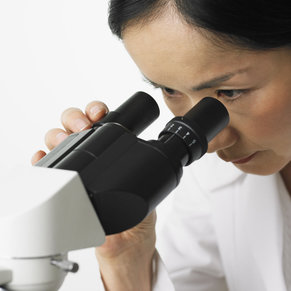 they function, it is known that some of the other organic constituents
they function, it is known that some of the other organic constituents
of the hops, including the valerianic acid have a sedative action on the
body. The compounds lupulon and humulon are also known to have an
antiseptic action.
An estrogenic effect is also attributed to the hops, in addition, the hops
aids in relaxing smooth muscles in the body. Central nervous activity is
also believed to be depressed by some of the isolated constituents present
in the hops.
The sedative and hypnotic effects of the alcoholic extract of hops was verified during the course of mobility tests in
rats and the presence of pharmacologically active concentrations of these compounds was detected in the freshly
prepared hop teas during laboratory tests. Folk lore based remedial properties of the hops is still to be verified and
though studies thus far have not come up with an explanation of supposed salutary effects of the hops, they do
supply - at least part of their tranquilizing action detected in the hops extract can be said to confirm traditional belief
associated with the hops. The rest of the traditionally held benefits of hops will probably be supported as the results
of continuing clinical investigations come out - hopefully for the larger benefit of humankind and medicine. These
studies will need to put the benefits of hops in a clinically significant light and on a reasonable certainty of its
efficacy and safety. almost all clinically significant hops usage that are being done now, depend on current controlled
clinical studies, for example, hops at a dose of 0.5 g dried hops or the equivalent volume hops extract is permitted to
be labeled and given "for discomfort due to restlessness or anxiety and sleep disturbances"- with future research,
hops remedies will hopefully be sold in a standard dose. Botanically speaking, hops is related to the marijuana, for
this reason, some clinical writers suggest smoking the plant material to help induce a state of mild
euphoria.Smoking the hops is not recommended, as similar to other types of smoke unpleasant side effects are
frequently experienced, and the safety associated with smoking hops or smoking itself is questionable and unhealthy.
Constituents
Hops contain volatile oil, valerianic acid, estrogenic substances, tannins, bitter principle, flavonoids.
Usual dosage
An herbal tea can be prepared from the dried hops fruits pouring 150 ml water to over one to two teaspoons of the
powdered dried hops fruit in a pot. The dried hops fruit must be allowed to steep into the water for 10 - 15 minutes
before it is ready for drinking by the patient. The hops based herbal tinctures can be used at doses of 1-2 ml taken
two or three times daily during the treatment regimen. Thrice or twice daily, supplements of the tablet or capsule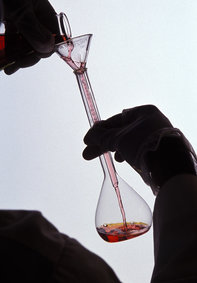
form can also be taken - these supplements are typically 500-1,000 mg per dose.
Combination herbal remedies, using mixtures of the hops with other herbs are
common; typically herbal sedatives like the valerian, the passion flower, and
the skullcap are used in such mixed herbal preparations.
Side effects and cautions
There exists no known or verified contraindications for the use of hops with other
medications and the herb is generally considered to be very safe. At the same time,
some reports indicate that a few persons may experience allergic skin rash following the
handling of dried hops flowers - pollen sensitivity may be the cause of such allergic reactions. At the same time,
pregnant women must avoid using large doses of hops as the herb has an anti-contractive effect if taken in excessive
amounts.
Applications
Strobiles:
- INFUSION – The herbal hops infusion can be taken for the treatment of insomnia; this infusion can be
- prepared by mixing two tsp of fresh hops per cup of boiling water. The mixture must be allowed to infuse and
- steep for five minutes and then taken as required. To prepare this infusion, some freshly dried or freeze dried
- stored hops can also be substituted if fresh hops in not available locally.
- TINCTURE – The herbal hops tincture can also be used at doses of up to 2 ml, thrice daily - in the role of a
- sedative for treating anxiety and nervous tension in patients. The tincture made from hops is often combined
- and used with other digestive herbs, it is combined with herbs like the marshmallow, the plantainand
- the chamomile as well as the peppermint for cases such as irritable bowel syndrome in patients aside from
- other digestive disorders. To treat an irritable stomach, about 1.5 ml of the tincture can be taken on
- a sugar lump. The tincture is also suggested for treating some forms of sexual problems, like premature
- ejaculation in men and other sexual conditions in men and women.
- COMPRESS – The hops based extract can also be used in the role of a compress. This can be done by
- soaking a pad in the infusion or diluted tincture and applying it on varicose ulcers and other topical conditions
- affecting the skin.
- WASH – Hops extract can also be used by taking the infusion made from fresh or some freshly dried hops
- and applying it directly as a treatment for topical chronic ulcers, for treating skin eruptions, as well as for the
- treatment of wounds on the skin.
- CAPSULES – Hops based nutritional capsules are commercially sold at herbal stores. These can be used as
- an appetite stimulant by taking two to three capsules before eating food. Hops capsules must not be used for
- more than a few days continuously.
Collection and harvesting
Hops cones are harvested late in the summer or early in the fall when the cones ripen. The ripened cones take on a
bronze coloring and are slightly open at one side. When stored too long at room temperature, hops lose its property 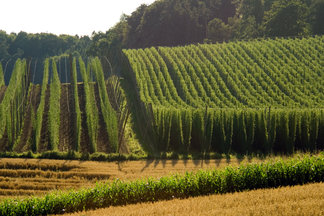
and effectiveness, while also producing a bad smelling chemical,
called valeric acid signaling spoilage. All storage of commercial hops
is carried out under cold conditions, a refrigerator can also be used
for this purpose, the hops must be protected from excessive exposure
to atmospheric oxygen in the air. If you plan to store hops for periods
of months, refrigeration is a very good idea. Place well dried and
fresh hops in a plastic bag, in order to minimize exposure to oxygen.
As much air as possible must be squeezed out of the bag before it is sealed, while crushing the hops in the process
must be avoided - this is the best method of storing hops for the long term. For craft uses, harvesting the cones
must be done while the hops cones are still light green in color and in a raw state. This is because, ripened cones
tend to crumble up and are difficult to preserve for such uses.
Sleep - inducing mini - pouch
- 1 cotton or linen pouch, 2 3/4 in x 3/4 in (5 cm x 2 cm)
- 2 3/4 oz (50 g) hop cones, dried
- 1 oz (30 g) catnip leaves, dried
- 3/4 oz (20 g) linden flowers, dried
Combine the plants and insert into the cloth pouch.
Slide the pouch inside your pillow to induce inspiring dreams
Article Credit Hops, Humulus Lupulus
by herbs2000.com
Other articles on the benefits of hops
References for various Scientific Papers on hops
About.com Alternative Article on benefit of hops
Oncology abstract on tumor inhibition by hops
Scientific Studies of Hops Health Benefits (Medical Health Guide)
YOU SHOULD ALWAYS SPEAK WITH A HEALTHCARE PROFESSIONAL BEFORE TAKING ANY DIETARY, NUTRITIONAL, HERBAL OR HOMEOPATHIC SUPPLEMENT. Hopwater™ does not warrant and shall have no liability for information provided in this site regarding recommendations concerning supplements for any and all health purposes. This information is provided solely as a guideline to be used when discussing a program with a healthcare professional. The claims made about specific nutrients or products have not been evaluated by the Food and Drug Administration. Dietary supplements are not intended to diagnose, treat, cure or prevent disease. Please consult with a healthcare professional before starting any diet, exercise or supplementation program. Hopwater™ makes no guarantee or warranty, express or implied, with respect to any products or services sold, including any warranty of merchantability or fitness for a particular purpose.





